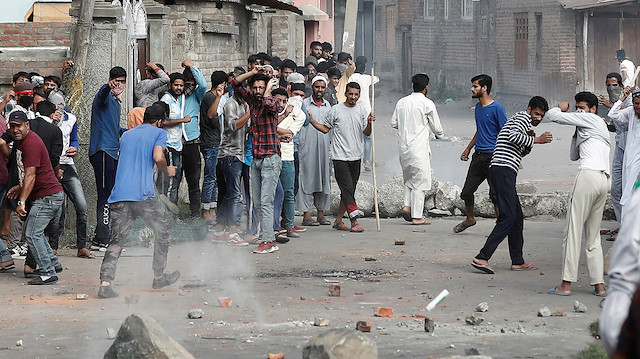
A communications blackout and restrictions are making the “bad human rights situation in [Jammu and] Kashmir even worse,” according to a global human rights watchdog.
“The Indian government’s indefinite shutdown of phones and the internet in Kashmir is causing disproportionate harm and should be lifted immediately,” said Meenakshi Ganguly, South Asia director at the New York-based Human Rights Watch (HRW), late Wednesday.
Jammu and Kashmir, a Muslim-majority region, has faced a severe communications shutdown -- with no Internet, landline, or cell phone service -- and restrictions since Aug. 5, said several rights groups, including HRW and Amnesty International.
The clampdown came immediately after New Delhi stripped the disputed region of special provisions guaranteed by the Indian Constitution under the Article 370.
“The restrictions are provoking anger, causing economic harm, and fueling rumors that are making a bad human rights situation even worse,” Ganguly explained.
While the government of Prime Minister Narendra Modi called the restrictions a “precautionary measure” to tackle the situation, political leaders in the region were detained as rights groups repeatedly called on New Delhi to lift the restrictions and release detainees.
HRW said the disruption of services has exacerbated an information blackout, stopped families from communicating, and prevented people from accessing medical care.
“International human rights law prohibits broad, indiscriminate, and indefinite restrictions on fundamental freedoms, including the right to free expression and to provide and receive information,” the rights group said.
However, Indian authorities have insisted that the clampdown is to “prevent the spread of false or incendiary information that could cause violent protests.”
Detailing the communications blackout, the rights group said: “Public access to phone services is available in some government offices but for Kashmiris to use them, they have to pass [through] numerous security checkpoints and then wait their turn for several hours.”
In Srinagar, Jammu and Kashmir’s capital, people told the rights group: “In effect, the government has placed all of us in prison. We cannot move freely. We cannot speak freely. Isn’t that prison?”
The group said the extended internet shutdown is depriving Kashmiris who depend on mobile messaging apps or email access for their livelihood.
“Traders cannot place or receive orders, tour operators cannot operate through their websites, students cannot complete course work, and journalists cannot file reports,” read the HRW statement.
The communication blackout is also hurting other essential activities and services, including "emergency services and health information, mobile banking and e-commerce, transportation, school classes, reporting on major crises and events, and human rights investigations,” said the group.
A government doctor staged a protest in Srinagar, saying the internet shutdown is preventing people, particularly the poor, from getting government health insurance, since it is linked to individual digital cards that need to be swiped to retrieve medical records.
“He was arrested,” the rights group said, citing media reports.
The human rights watchdog urged the Indian government to use social media to spread transparent information to discourage violence and instruct security forces to act in line with global human rights standards.














